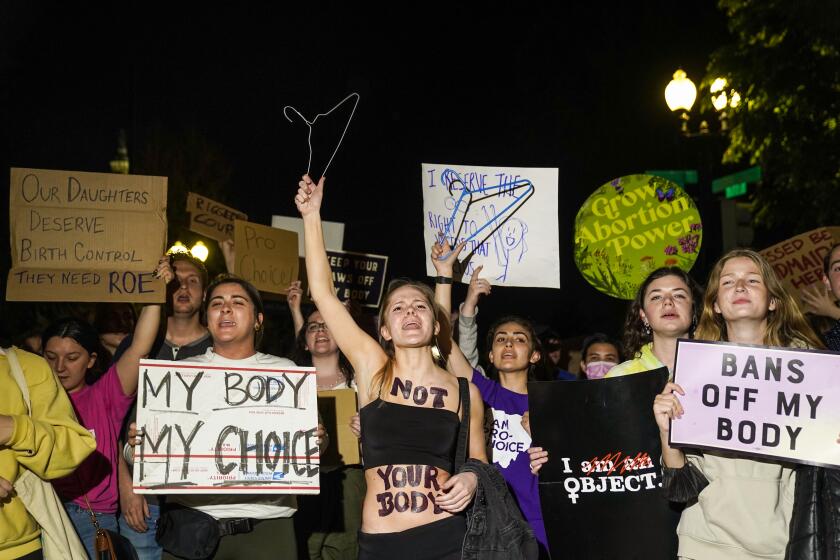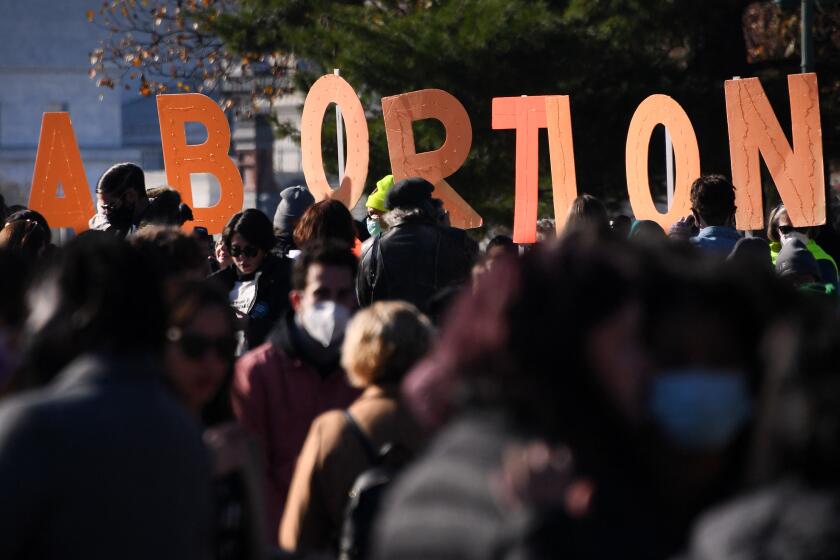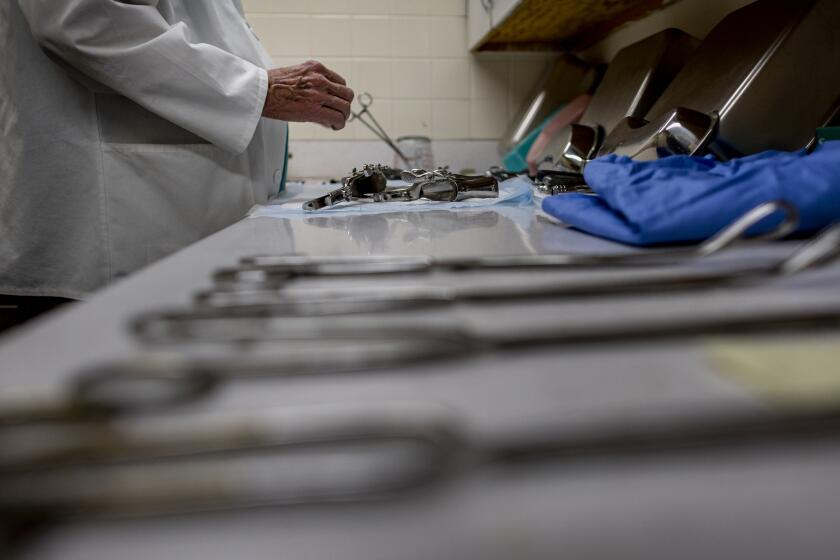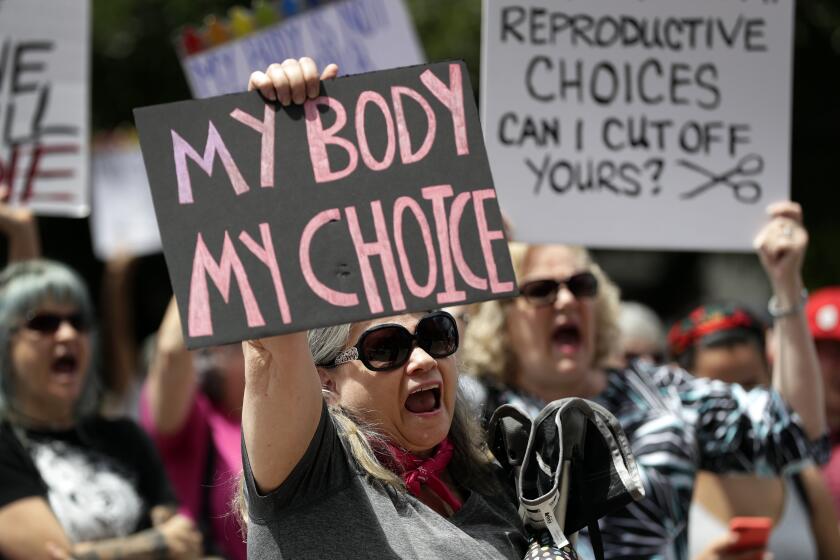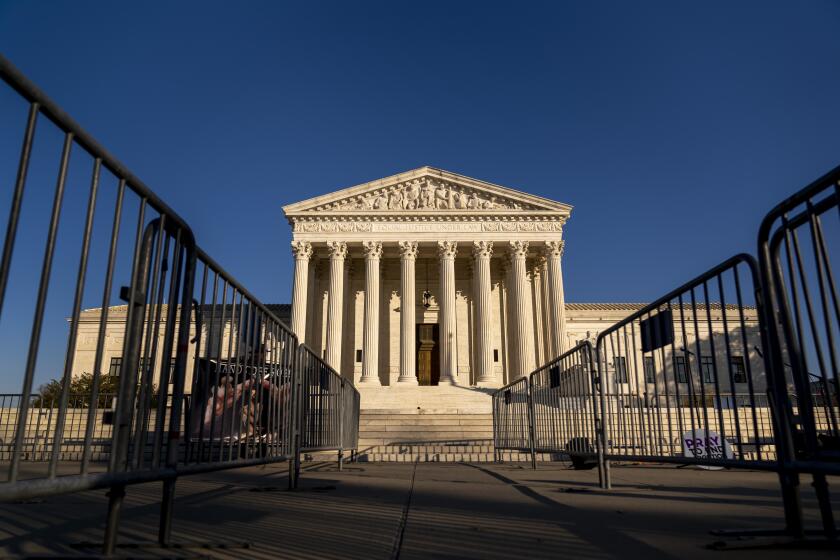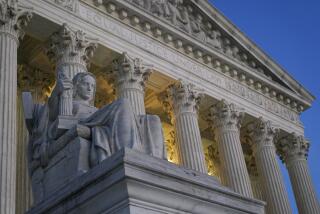Roe vs. Wade will be overturned, purported leaked Supreme Court draft suggests

- Share via
WASHINGTON — The Supreme Court is ready to overturn Roe vs. Wade and allow states to outlaw abortion, according to a purported draft opinion that was leaked to Politico.
It is highly unusual for the high court to overturn a landmark decision. But it is even more extraordinary for a draft Supreme Court opinion to leak out in advance of its final release.
That a draft document emerged from the normally buttoned-down, secretive high court is yet another sign of how politically divisive the abortion case has become.
The Los Angeles Times could not authenticate the purported draft. Sometimes draft rulings can be revised in the final months as justices weigh in during the writing process.
California officials and abortion providers spoke out after the leak of a purported U.S. Supreme Court draft opinion that would allow states to outlaw abortion.
According to Politico, Justice Samuel A. Alito Jr. wrote a draft in February that says the Roe abortion ruling was “egregiously wrong” and should be overturned completely.
Such an outcome would not be a surprise. Alito and Justice Clarence Thomas have made clear for years they thought Roe should be overturned. In recent years, they have been joined by three Trump appointees who agree with them: Justices Neil M. Gorsuch, Brett M. Kavanaugh and Amy Coney Barrett.
During the oral argument in December, Chief Justice John G. Roberts Jr. focused on the Mississippi law and its 15-week limit on abortion, which is at the heart of the current discussion.
Roberts argued that the court should decide that issue and stop there. The tenor of his argument suggested the five conservatives on his right were leaning toward overturning Roe entirely.
Typically justices take a tentative vote on an issue in their private conference, and the majority then begins work on a draft opinion.
But the outcome is not set until all the justices have signed off, and it is not uncommon for the wording or votes in some cases to change in May or June.
In the upcoming session, California legislators hope to push forward Senate Bill 245, which would put an end to out-of-pocket costs paid by those seeking abortions.
In 2012, for example, it appeared there were five justices ready to strike down the Affordable Care Act, but the chief justice switched his vote and decided on a narrow way to uphold it.
The leak of the draft opinion reflects what has become an intense fight within the court over the abortion ruling.
Last week, the Wall Street Journal editorial page voiced alarm over what it called “lobbying” within the court to get one of the justices — most likely Kavanaugh — to join Roberts in a more narrow ruling. That report — detailing the court’s inner workings — was itself another break with the usual confidentiality.
Kavanaugh has often joined Roberts, and he was the most likely defector from a five-justice bloc to strike down Roe entirely. Kavanaugh showed no sign of joining Roberts when the case was heard in December.
The liberal justices — and more likely their clerks and friends — may have wanted to sound the alarm before it is too late that five justices had voted to strike down Roe.
“The Future of Abortion” is a series of stories about the state of abortion is it is challenged in America.
Abortion opponents expressed shock at the leak and expressed worry that it was done to pressure the conservative justices.
“The left continues its assault on the Supreme Court with an unprecedented breach of confidentiality, clearly meant to intimidate,” Sen. Josh Hawley (R-Mo.) tweeted. “The Justices mustn’t give in to this attempt to corrupt the process. Stay strong.”
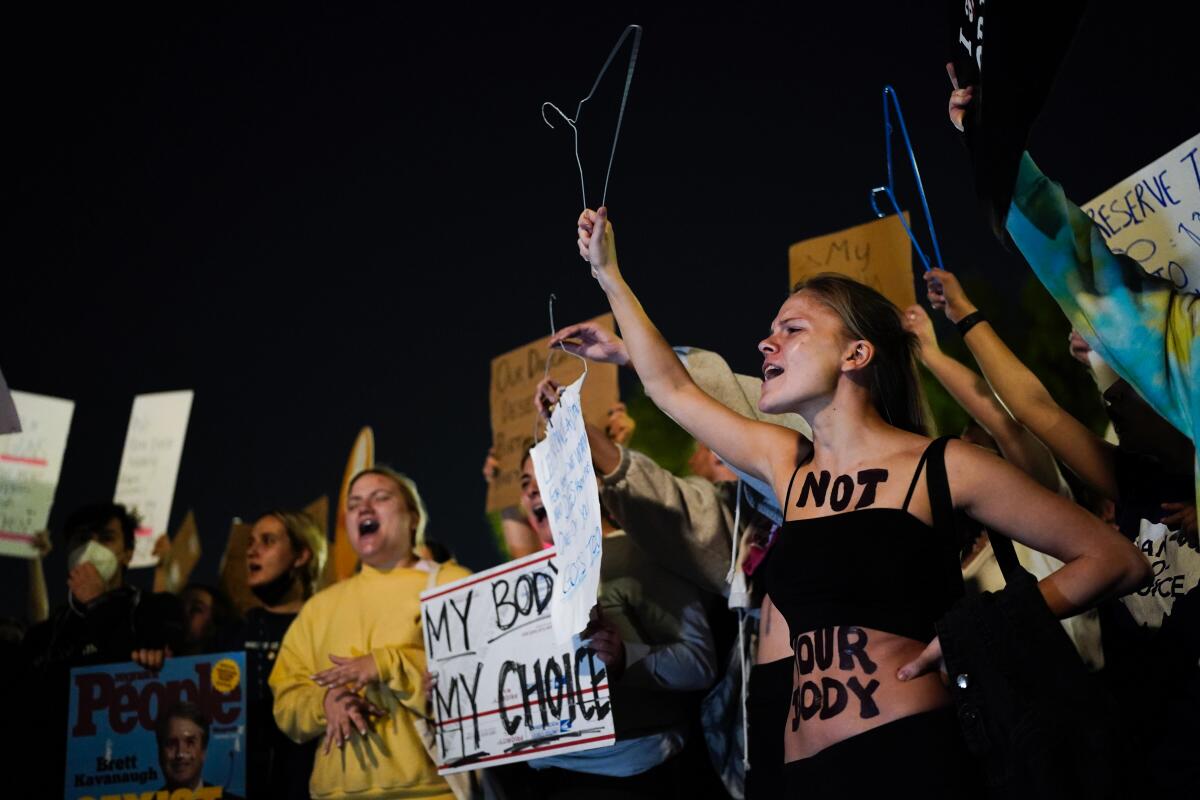
Abortion rights supporters expressed outrage at the draft opinion.
In a statement Monday night by top Democrats, Senate Majority Leader Charles E. Schumer and Speaker Nancy Pelosi said, “If the report is accurate, the Supreme Court is poised to inflict the greatest restriction of rights in the past 50 years — not just on women but on all Americans. The Republican-appointed justices’ reported votes to overturn Roe v. Wade would go down as an abomination, one of the worst and most damaging decisions in modern history.”
Abortion has always been the subject of fierce debate at the court — and sometimes unexpected switches.
In the spring of 1992, it looked as though a conservative majority was prepared to strike down the right to abortion in a Pennsylvania case.
Chief Justice William H. Rehnquist had dissented in the 1973 Roe decision, along with Justice Byron White, and they were joined by five new conservative appointees of Presidents Reagan and George H.W. Bush.
Rehnquist wrote an opinion for the court that would weaken the right to abortion.
While other states restrict abortion and the Supreme Court weighs Roe vs. Wade, California is preparing to serve the country’s abortion patients.
But to his surprise, Justices Sandra Day O’Connor, David H. Souter and Anthony Kennedy met together and decided to join in a middle-ground ruling that allowed more regulation of abortion, but preserved a woman’s right to make the abortion decision.
Rehnquist did not learn of the switch until mid-May.
The outcome was a surprise 5-4 ruling in Planned Parenthood of Southeastern Pennsylvania vs. Casey that upheld abortion rights.
That defeat for the conservative movement came as shock and led directly to the composition of the current court.
Lawyers for the Federalist Society began carefully screening potential court nominees to assure themselves those justices would not waver when it came time to overturn Roe vs. Wade.
If the draft opinion holds, the ruling amounts to abortion rights’ supporters worst-case scenario: It would give states authority to set their own rules on abortion.
Twenty-six states are certain or likely to ban abortion in this scenario, according to an analysis by the Guttmacher Institute, a research organization that supports abortion rights.
It would likely mean that abortion is banned or essentially banned in the South and parts of the Mountain West, where many conservative state legislatures have already enacted such bills in anticipation of a Supreme Court decision like this.
Those that have not already acted would be expected to do so quickly.
If the Supreme Court strikes down Roe vs. Wade, Congress could pass legislation to keep abortion legal across the country.
Texas has already banned abortion after fetal cardiac activity is detected or about 6 six weeks of pregnancy. Oklahoma recently approved a total abortion ban with an exception only to preserve the woman’s life in a medical emergency. Many recent abortion bans have been enacted without exceptions for cases resulting from rape or incest.
Patients in states such as Louisiana, Florida or Texas would likely have to travel hundreds of miles to reach an abortion provider in states that are expected to have abortion access, such as California, Illinois or Maryland, or pursue at-home remedies.
Democratic-led states like these are expected to preserve their liberal abortion laws, with few limits on the procedure, particularly until a fetus is viable outside the womb at about 24 weeks.
Political battles would likely play out in the statehouses of swing states or those in which one party controls the legislature and the governor controls the other.
In Michigan, Democratic Gov. Gretchen Whitmer recently went to court to try to get her state’s pre-Roe abortion prohibition stripped from the books. She previously asked her Republican-controlled legislature to repeal the ban, but it went nowhere.
Democrats hope overturning Roe would galvanize their voters in the November midterm elections. Abortion has seldom moved the needle in the past, but many voters have operated under the theory that Roe would never be overturned.
More to Read
Get the L.A. Times Politics newsletter
Deeply reported insights into legislation, politics and policy from Sacramento, Washington and beyond. In your inbox three times per week.
You may occasionally receive promotional content from the Los Angeles Times.
